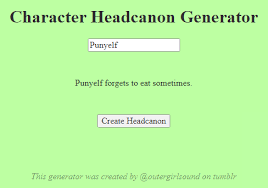The relational aspect of a character headcanon grounded in an understanding of human psychology is what makes the blend of psychology and character development such a rich, complex, and reciprocal site for creative storytelling across a variety of mediums. Psychology - to make sure your characters are not just interesting, but also able to stand on their two feet and fill a role on the team that makes psychological sense. In literature, film, and computer games as well as tabletop role-playing games, this integration will allow characters to be created with much more depth and authenticity.
Character Motivation and Behaviour
Every character headcanon revolves around the motivation of the character, which psychology is so good at figuring and clarifying. This matters because it gives the character realistic psychological reasons for acting and deciding as he or she does. For example, a character could have a psychological motivation for belonging that informs what they do and all of their relationships within the story. One such study in 2021, from the perspective of narrative psychology, points out that characters designed with their psychological motivations in mind and given motivationality are more likely to engage and elicit empathy from their audiences.
Character arcs that Make Sense.
This creates consistency in character behavior, which is important when developing believable character arcs, which is essential in good writing. Psychological theorieslike cognitive dissonance, when one character has contradictory beliefs, can help with creating of the internal conflicts and resolutions of a person. This is what often snags readers or viewers: they will see one consistent and believable theory of development or change that fits with the psychodynamics of the character.
Increasing the Identifiable You with Personality Characteristics
Creating believable, living characters by utilising this wide-set of older psychological traits. Extraversion, neuroticism, even openness from the Big Five personality traits - traits like these give us a template for creating complex characters. For instance, a character with a high level of openness may possess traits of curiosity and imagination - traits that may define their role in adventure or fantasy genres. It characterizes the audience and makes it relate more and more to the story, so the remainder finds a piece of itself at some angle of those characters.

Character Headcanons Related to Psychological Disorders
Including mental disorders in your headcanons gives the people a depth of feeling and reality it previously lacked. This kind of stuff is crucial for writers to make it realistic and relatable to real world experiences. Characters with anxiety, PTSD, or depression can help to destigmatized mental health issues and allow audiences to open up a discussion. A 2022 survey found that screen portrayals of mental health conditions that have been researched well have meaningfully improved awareness and understanding in a study of hundreds of films and series.
Predictable and Unpredictable Character Movement
Psychology helps to influence pre-defined and predictable responses related to character trait but also the reactions that are shockingly plausible and slaked in the narrative. A surprising character choice presented through a psychological continuum may be seen as credible and logical and lea you to a better film-watching experience. It is this blend of predictability and novelty that makes narratives interesting, and captures attention.
Creating Emotional Texture in Characters Through Digital Tools
Digital tools such as the character headcanon creator provide simple resources to incorporate psychological components into character development. Using these tools, creators are able to identify traits and motivations of characters of characters based on underlying principles of psychology and able to predict how the story will unfold through development of characters.
The Mental Advantage of Stories
Psychology in character headcanons is not about just designing convincing characters, - but rather imbuing your world with layers of psychological depth, authenticity, and emotional salience. Psychology — whether it be knowing the motivations of a character too well, using mental disorders ironically, or making relatable characters — is a powerful accessory to someone telling a story. This blending of psychology and character creation not only serves to enhance individual character portraits but provides tools to make even more powerful storytellers out of the lot of us.